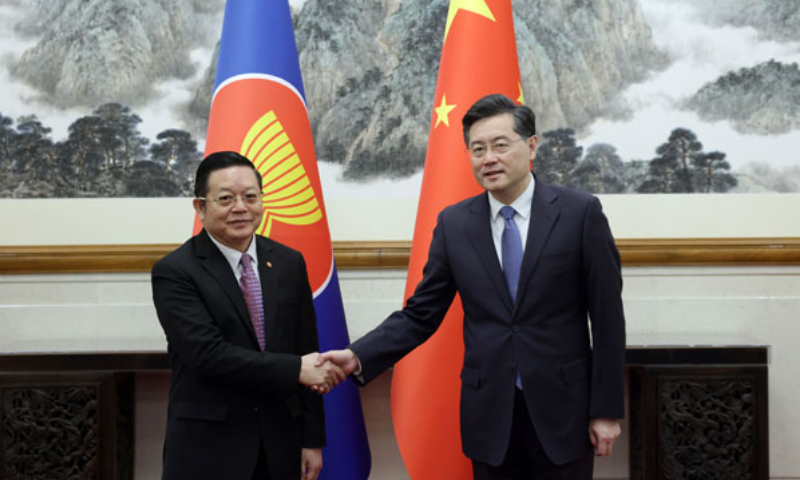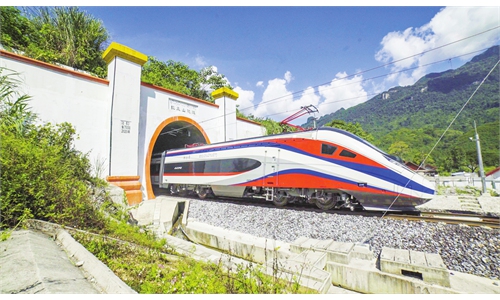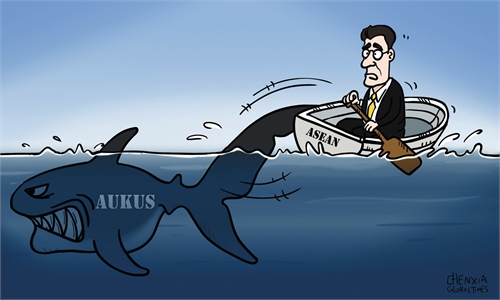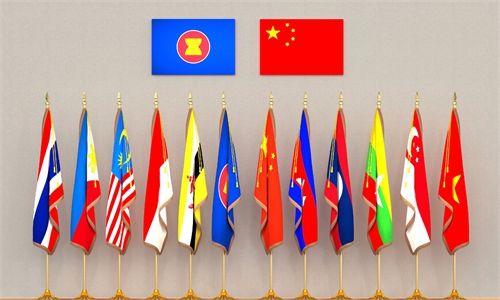
Chinese State Councilor and Foreign Minister Qin Gang (right) meets with ASEAN Secretary-General Kao Kim Hourn in Beijing on Monday. Photo: fmprc.gov.cn
When the world is under an increasingly urgent and realistic danger of a nuclear war and possible destruction of nuclear non-proliferation, China has once again demonstrated its strong determination as a responsible major power to protect the region from nuclear threats.On Monday, during a meeting with the visiting ASEAN Secretary-General Kao Kim Hourn, Chinese State Councilor and Foreign Minister Qin Gang said that China is willing to take the lead in signing the Protocol to the Treaty on the Southeast Asia Nuclear Weapon-Free Zone (SEANWFZ Treaty) and work with ASEAN to advocate solidarity and win-win cooperation, jointly safeguarding regional security and stability.
The SEANWFZ Treaty, also known as the Bangkok Treaty, was signed by all ASEAN members in December 1995, as a commitment to preserve the Southeast Asian region as a region free of nuclear and other weapons of mass destruction. The Protocol to the SEANWFZ Treaty is open to signature by the five recognized nuclear-weapon states - China, Russia, the US, the UK and France. Once China signs the Protocol, it will be the first of the five permanent members of the United Nations (UN) Security Council to do so.
The SEANWFZ Treaty is ASEAN's concrete implementation of the Treaty on the Non-Proliferation of Nuclear Weapons. Establishing a nuclear weapon-free zone in Southeast Asia is quite important for regional peace and stability, as it has ensured nuclear non-proliferation in the region and helped prevent some extraterritorial countries from using nuclear weapons to flaunt their power in the region.
The current Asia-Pacific region is again facing nuclear threats. In particular, the AUKUS formed by the US, the UK and Australia is constantly testing the bottom line of nuclear non-proliferation principles, triggering concerns from countries in the region, such as Malaysia and Indonesia.
In a recent opinion piece for the Global Times, Malaysian scholar John Pang wrote that "AUKUS is the speartip for the militarization and polarization of Southeast Asia. It is a raw application of the with-us-or-against-us logic of the rules-based order."
Chinese military expert and TV commentator Song Zhongping believes that there are considerations to deal with AUKUS in China's interest in signing the Protocol. "AUKUS' possible actions may provoke nuclear proliferation in the region, turning Southeast Asia into a training ground for nuclear weapons and an arena for the dangerous arms race," Song said.
For China, it is crucial to ensure that Southeast Asia maintains a peaceful region free of nuclear proliferation for its own safety. But most importantly, China's willingness to sign the Protocol clearly proves the country takes its due responsibility as a major power that seeks peaceful development. It is in stark contrast to the irresponsible behaviors of the AUKUS countries, especially the UK and the US, both of which are nuclear-weapon states and permanent members of the UN Security Council as China is.
These two countries are supposed to act more proactively to prevent nuclear proliferation, yet they choose to ignore the possible threat of assisting a non-nuclear weapon state in acquiring nuclear submarines. How hypocritical it is when they try to do so while boasting of maintaining world peace and stability!
China's support for ASEAN's efforts to build a nuclear weapon-free zone and willingness to sign the Protocol to the SEANWFZ Treaty are a clear signal against countries that want to exploit certain issues to arm another country with nuclear technology in the Asia-Pacific, especially in Southeast Asia.
China's moves will be just the beginning. Only when more countries, particularly those with nuclear weapons, decide to do the same can regional peace and stability be maintained.
"Twenty years ago, China was the first among ASEAN's dialogue partners to join the Treaty of Amity and Cooperation in Southeast Asia. Now if China signs the Protocol, it will actually set up a good example and encourage other countries, especially other nuclear-weapon states, to follow its steps," said Xu Liping, director of the Center for Southeast Asian Studies at the Chinese Academy of Social Sciences.
It is hoped that not only ASEAN countries but also more countries in the Asia-Pacific region will see the danger that AUKUS poses. We should work together to make our region a source of peace and stability, rather than living in constant fear of nuclear proliferation and threats.



